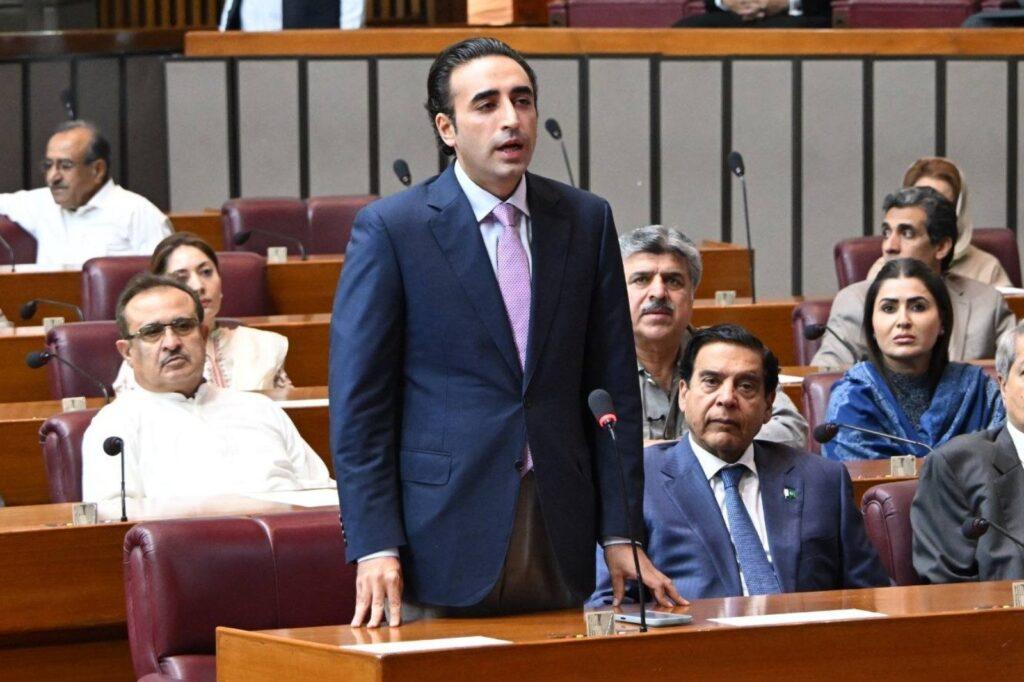The president of the Popular Party of Pakistan (PPP), Bilawal Bhutto Zardari, said on Monday that Pakistan would consider the war if India refused to honor the treaty of the Indo’s waters, while condemning recent American air attacks on Iranian nuclear facilities, calling them “based on lies.” Express news reported.
When addressing the National Assembly during the current budget session, Bilawal said that attacks on Iran’s nuclear sites and the orientation of scientists and journalists were not justified and violated international standards.
He said his party was consulted on the budget this time, and some of his contributions had joined the budget. He appreciated the Government for expressing its consent to PPP recommendations, including leaving the digital tax on services to the jurisdiction of the provinces and reducing sales tax in the solar panels of eighteen percent to ten percent.
Bilawal expressed his satisfaction with the improvements in economic indicators, especially the reduction of inflation as a result of government policies. He praised the twenty percent increase in the Benazir entrance support program.
Read: India failed both military and diplomatically against Pakistan: Bilawal
He demanded the declaration of an agricultural emergency, saying that he would provide relief to farmers and protect the backbone of the economy.
Bilawal Bhutto Zardari mentioned that the defense budget had been improved by twenty percent due to the hostile position of India. He said that Pakistan had once again the Kashmir’s dispute.
Referring to the visit of a high -level delegation taken by him to several capitals, Bilawal Bhutto Zardari said that Pakistan had defeated India on the battlefield, as well as on the diplomatic and narrative fronts. He said they presented Pakistan’s position and narrative based on La Paz.
He said that India had only two options: either to fulfill the Indo Water Treaty, or Pakistan would fight a war to ensure the water of the six rivers.
He added that such actions were part of a broader pattern of aggression that began with Gaza, continued in Yemen and has now reached Iran.
Read more: ‘There is no military solution to Pak-India disputes’
He warned: “If India does not respect the Water Treaty of the Indo, Pakistan will go to war,” emphasizing that India has already lost and Pakistan has already won on diplomatic and political fronts.
The tension between Pakistan and India began on April 22, when an attack in Pahalgam killed 26 people. India blamed Pakistan for the incident. However, Pakistan categorically rejected Indian guilt.
In response, India carried out a series of hostile actions the next day of April 23, including the suspension of the 65-year-old Indus Water Treaty (IWT), canceling the visas for Pakistani citizens, closing the border crossing of Wagah-Attari, ordering the closure of Pakistan’s high commission in New Delhi, and reduction of the diplomatic staff of the crosses.
Criticizing the previous Pakistani leadership for what he described as weak responses to Indian actions in Kashmira, Bilawal said the current government had demonstrated resolution by demolishing six Indian combat planes in response to the Indian incursions, stating that the subject of Kashmir had been internationalized once again.
In addition, he claimed that the Indian and Israeli lobbies were actively working for Malignan to Pakistan worldwide, including attempts to re -place the country on the Fatf Gray list; The efforts that, they said, had failed.
Bilawal asked for peace between Pakistan and India, but stressed the need for military preparation, citing India’s refusal to officially recognize the high fire.
He praised the increase in Pakistan’s defense budget and supported funds for non -controversial dams, while advocating the reduction of solar energy taxes and the greatest social support through Benazir’s income support program.
In response to the opposition, Bilawal said his party, although not in the federal cabinet, remained committed to representing people’s concerns and bringing criticism and constructive proposals to the table.




